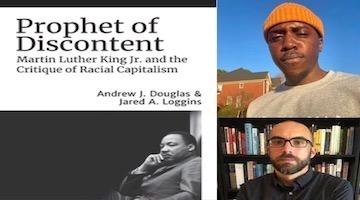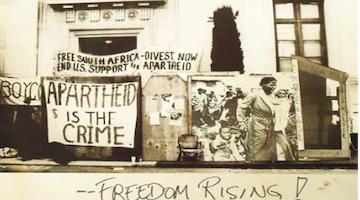Related Stories
Keeanga-Yamahia Taylor
Historian Elizabeth Hinton’s book reveals that, in the late sixties and early seventies, there were hundreds of local rebellions against white viol
joshua briond
The response to Black rebellion are all distinct types of “reforms” to politically sedate Black surplus populations and sustain white settler-capit
Roberto Sirvent, BAR Book Forum Editor
Jazzman William Parker’s work is a bold art of resistance to capitalism, colonialism, racism, and the runaway train that is our present-day America
Joy James
Joy James uses poet Lucille Clifton's image of “new bones” to reflect on a series of revolutionary anniversaries in 2021 and the nature of pol
Roberto Sirvent, BAR Book Forum Editor
The authors set out to reconstruct King’s critical theory of racial capitalism.
George Yancy
White supremacist culture is a permanent site of predatory consumption, extraction and violation.
Editors, The Black Agenda Review
By what stretch of the imagination can the US be a democracy when ordinary citizens have virtually no influence over what their government does?&…
Charisse Burden-Stelly, PhD
The celebration of Isabel Wilkerson’s Caste reflects the continued priority of elite preferences over the needs and struggles of
Gustavus Griffin
A significant portion of sports franchise wealth can be traced directly to the oppression and displacement of Black and Brown bodies.
Editors, The Black Agenda Review
The phrase racial capitalism first emerged in the context of the anti-Apartheid and southern African liberation struggles in the 1970s.
More Stories
- Black Agenda Radio with Margaret KimberleyIn this week’s segment we discuss a new book analyzing the need to confront counterinsurgency and fight against repression domestically and internationally. But first we hear from an activist on the…
- Black Agenda Radio with Margaret Kimberley and Glen FordAfeni is an activist and lead organizer with Herb and Temple in Washington, DC. She joins us from Washington to discuss Donald Trump’s declaration of emergency power to take over the operations of…
- Black Agenda Radio with Margaret KimberleyJoy James is a scholar and a political philosopher who works with organizers. She is editor of the new book Confronting Counterinsurgency: Cop Cities & Democracy’s Terrors, which is published by…
- Margaret Kimberley, BAR Executive Editor and Senior ColumnistThe treachery of the Black misleadership class knows no bounds. While Trump’s latest racist dog whistle about “born criminals” is condemned, double-talking scoundrels may pretend to be horrified…
- Ajamu Baraka, BAR editor and columnistThe Trump administration’s declaration of war on American cities is a logical escalation of the white supremacist project. This is not a policy shift but a clearer revelation of the settler state's…



















